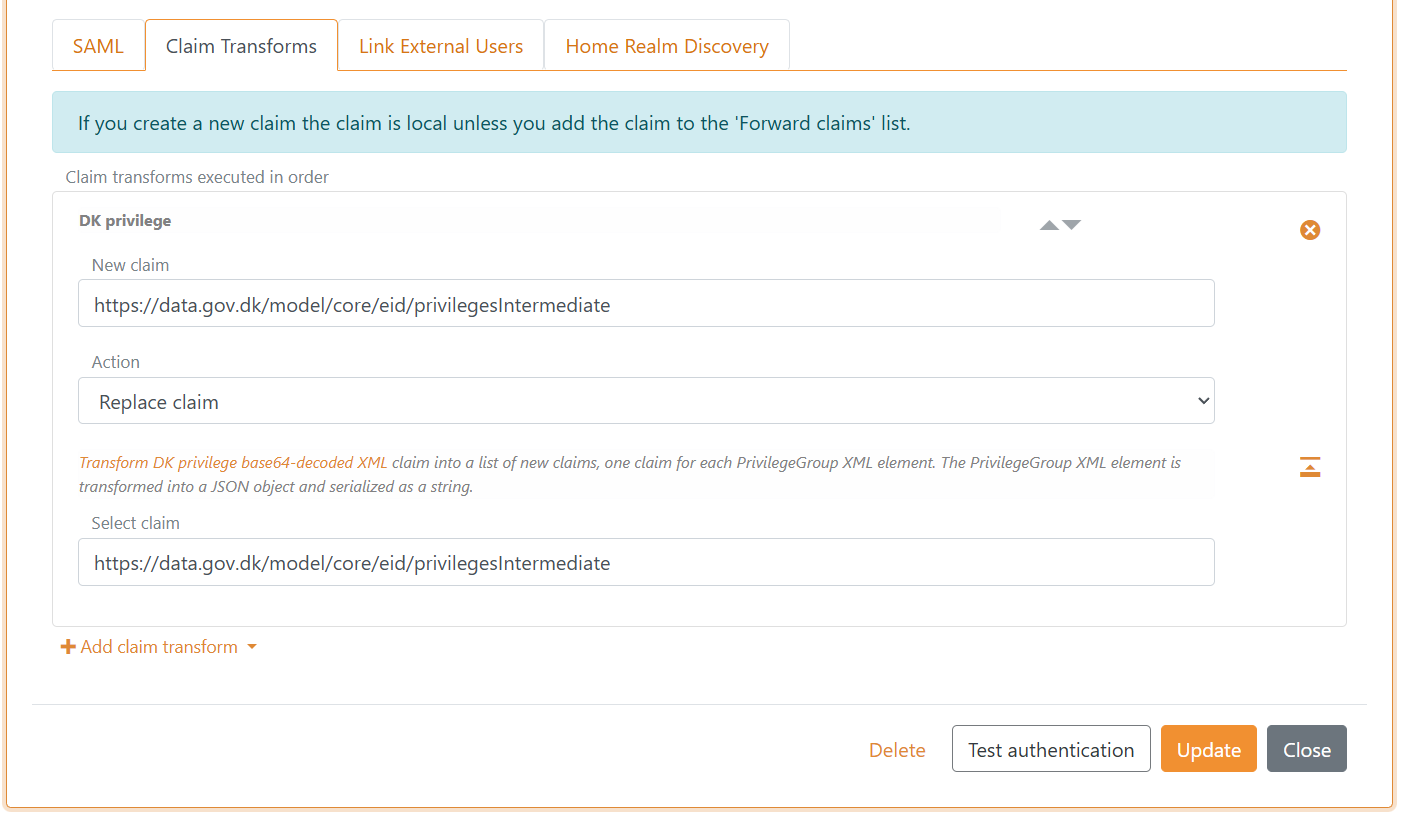DK privilege - claim transforms
FoxIDs supports converting the DK XML privilege to JSON, making tokens readable and the privilege structure easter to work with. The DK privilege is used in the Danish NemLog-in and Context Handler (in Danish called Fælleskommunal Adgangsstyring).
Supported privilege standard:
- OIO Basic Privilege Profile, Version 1.2
- FoxIDs support
PrivilegeGroupelements defined in model 2 (scoping and delegation) and model 3 (scoping, delegation and constraint). - FoxIDs support both to read the base64-encoded privilege string from the standard claim
https://data.gov.dk/model/core/eid/privilegesIntermediateand a custom defined claim.
Configuring DK privilege - claim transforms
The DK privilege can both be configured in a SAML 2.0 authentication method and application registration and likewise in a OpenID Connect authentication method and application registration.
- The SAML 2.0 claim
https://data.gov.dk/model/core/eid/privilegesIntermediateis transformed. - The OpenID Connect / JWT claim
privileges_intermediateis transformed.
Configure the DK privilege claim transformer on SAML 2.0 authentication method in FoxIDs Control Client:
- Select the Claim transform tab
- Click Add claim transform and click DK XML privilege to JSON
- Click Update

Model 2
The DK privilege claim is transformed into a list of claims, one claim for each group. The XML PrivilegeGroup element is transformed into a JSON object and serialized as a string.
The 4 possible scopes are translated into a properties with a short name:
Scope="urn:dk:gov:saml:cvrNumberIdentifier:<cvr_number>"become"cvr": "<cvr_number>"Scope="urn:dk:gov:saml:productionUnitIdentifier:<p_number>"become"p": "<p_number>"Scope="urn:dk:gov:saml:seNumberIdentifier:<se_number>"become"se": "<se_number>"Scope="urn:dk:gov:saml:cprNumberIdentifier:<cpr_number>"become"cpr": "<cpr_number>"
The Privilege element(s) are translated into the property p with the privilege values(s) as a list.
DK privilege base64-decoded sample:
(with extra spaces and line breaks for display purposes only)
<?xml version="1.0" encoding="UTF-8"?>
<bpp:PrivilegeList xmlns:bpp="http://digst.dk/oiosaml/basic_privilege_profile" xmlns:xsi="http://www.w3.org/2001/XMLSchema-instance" >
<PrivilegeGroup Scope="urn:dk:gov:saml:cvrNumberIdentifier:12345678">
<Privilege>urn:dk:some_domain:myPrivilege1A</Privilege>
<Privilege>urn:dk:some_domain:myPrivilege1B</Privilege>
</PrivilegeGroup>
<PrivilegeGroup Scope="urn:dk:gov:saml:seNumberIdentifier:27384223">
<Privilege>urn:dk:some_domain:myPrivilege1C</Privilege>
<Privilege>urn:dk:some_domain:myPrivilege1D</Privilege>
</PrivilegeGroup>
</bpp:PrivilegeList>
Is translated into two claims with JSON values:
(with extra spaces and line breaks for display purposes only)
{
"cvr": "12345678",
"p": [ "urn:dk:some_domain:myPrivilege1A", "urn:dk:some_domain:myPrivilege1B" ]
}
and
{
"se": "27384223",
"p": [ "urn:dk:some_domain:myPrivilege1C", "urn:dk:some_domain:myPrivilege1D" ]
}
Model 3
Model 3 is an extension to Model 2.
The Constraint element(s) are translated into the property c with the constraint(s) as a list of key value pairs.
DK privilege base64-decoded sample:
(with extra spaces and line breaks for display purposes only)
<?xml version="1.0" encoding="UTF-8"?>
<bpp:PrivilegeList xmlns:bpp="http://digst.dk/oiosaml/basic_privilege_profile" xmlns:xsi="http://www.w3.org/2001/XMLSchema-instance" >
<PrivilegeGroup Scope="urn:dk:gov:saml:cvrNumberIdentifier:12345678">
<Constraint Name="urn:dk:kombit:KLE">25.*</Constraint>
<Constraint Name="urn:dk:kombit:sensitivity">3</Constraint>
<Privilege>urn:dk:kombit:system_xyz:view_case</Privilege>
</PrivilegeGroup>
</bpp:PrivilegeList>
Is translated into one claims with JSON values:
(with extra spaces and line breaks for display purposes only)
{
"cvr": "12345678",
"c": [ { "urn:dk:kombit:KLE": "25.*" }, { "urn:dk:kombit:sensitivity": "3" } ]
"p": [ "urn:dk:kombit:system_xyz:view_case" ]
}
Using JSON privilege claim in an application
The application registration application receives the privilege claim with the privilege serialized as a JSON string.
The following C# code example show how to deserialize the JSON claim to an object in ASP.NET Core application using Newtonsoft.Json.
Create privilege group class
public class DkPrivilegeGroup
{
[JsonProperty(PropertyName = "cvr")]
public string CvrNumber { get; set; }
[JsonProperty(PropertyName = "pu")]
public string ProductionUnit { get; set; }
[JsonProperty(PropertyName = "se")]
public string SeNumber { get; set; }
[JsonProperty(PropertyName = "cpr")]
public string CprNumber { get; set; }
[JsonProperty(PropertyName = "c")]
public Dictionary<string, string> Constraint { get; set; }
[JsonProperty(PropertyName = "p")]
public List<string> Privilege { get; set; }
}
and deserialize the claim in e.g., a controller
var privileges = User.Claims.Where(c => c.Type == "privilege")
.Select(c => JsonConvert.DeserializeObject<DkPrivilegeGroup>(c.Value)).ToList();
foreach(var privilege in privileges)
{
// TODO handle access based on the privilege
}